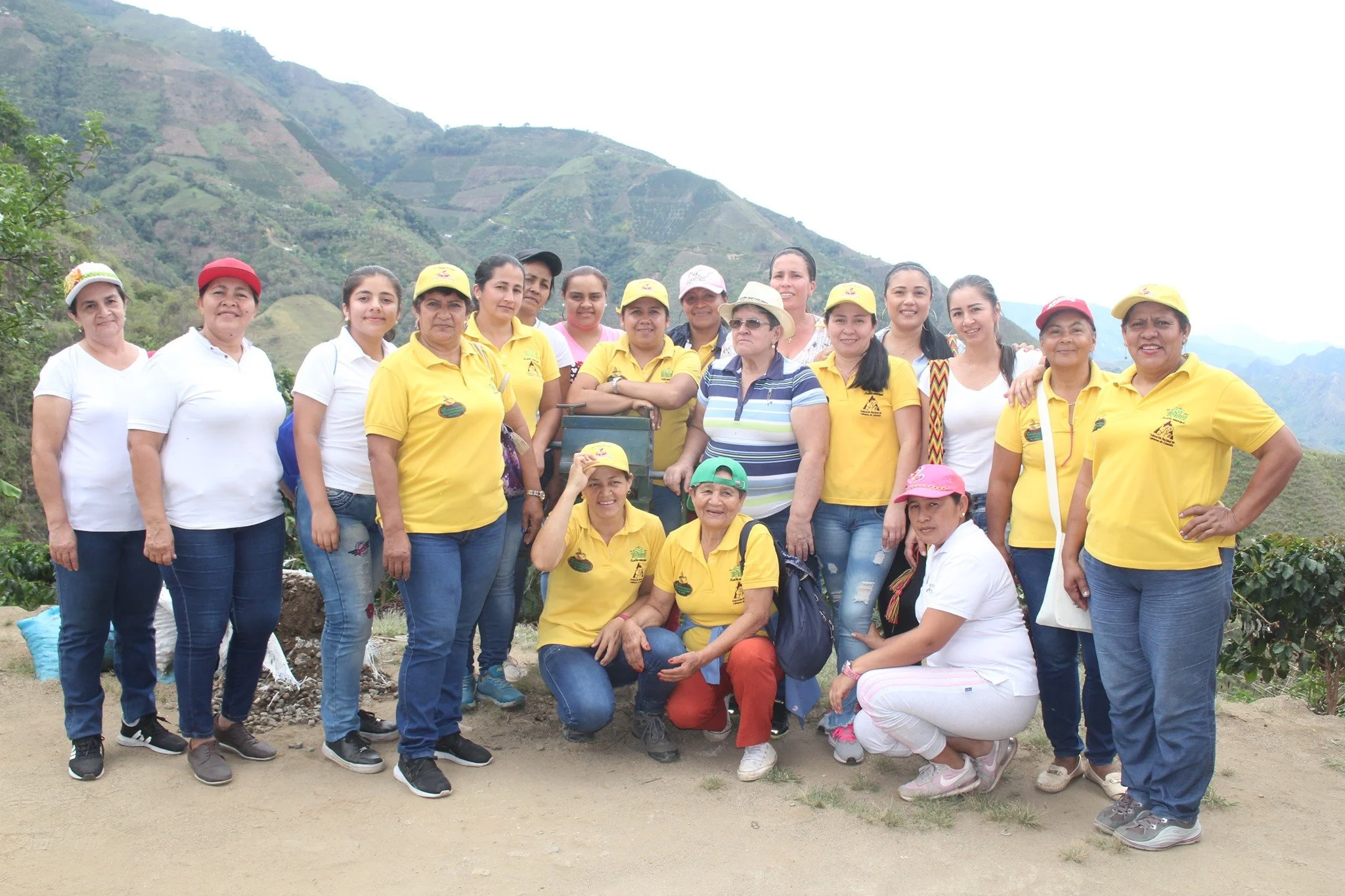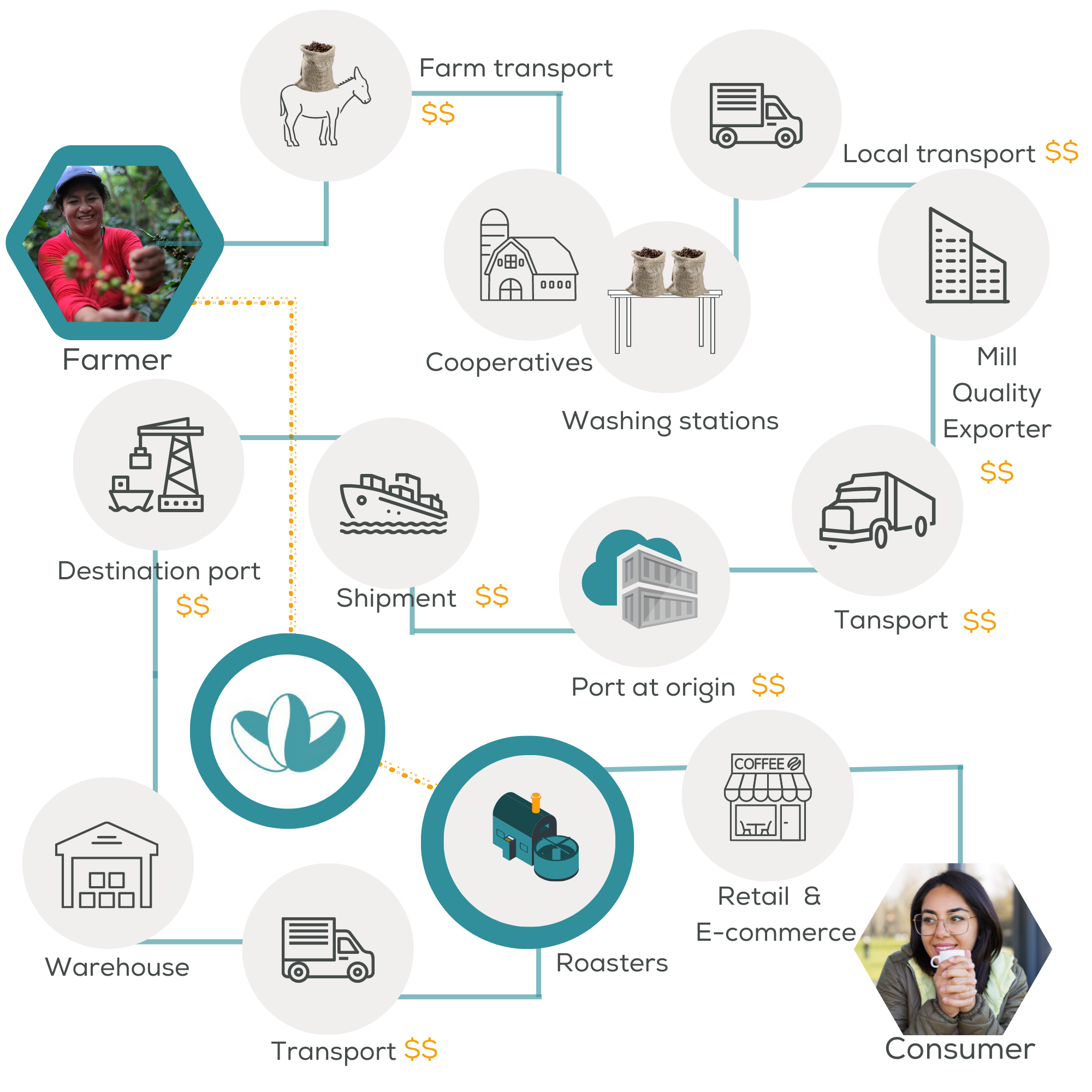Laura Amado On Social Impact Technology Creating Equitable Value Chains For Coffee Farmers
Laura Amado is the co-founder and director of Fantine, a solution that is digitising the coffee value chain and helps growers to earn a fair price for their crops.
Laura believes that social impact companies are the real drivers of change in society and that tomorrow’s economy will be driven by inclusive business models that reward excellence, quality and fair competitiveness.
As an experienced marketer, social entrepreneur and innovator, she is committed to building a more equitable economy, where everyone should be rewarded for their hard work and receive a fair price for it. Laura believes that inequalities in agriculture can’t be solved with aid, charity and social programs, which can only stem the effects but not the causes.
Laura completed executive studies on Sustainable Investments in Agriculture from Columbia University. At Fantine, she won the Founder for Purpose competition in 2019 and she was a runner-up for the 2020 Global Maker Challenge in the Innovation for Inclusive Trade.
Laura discusses helping coffee growers engage customers directly in socially responsible and sustainable practices, and leveraging digital platforms to connect with conscious consumers.
Highlights from the interview (listen to the podcast for full details)
[Indio Myles] - To start off, could you please share a bit about your background and what led to your work in sustainable business?
[Laura Amado] - I actually come from a very different background prior to founding Fantine. I worked for several years as a marketing manager and product manager in the IOT space and then in pharmaceuticals. However, I have always had the drive to create a company related to coffee and that was able to help and serve people through technology. Since I moved from Colombia several years ago, it has been very shocking to me to see the great contrast between the value given to coffee in consuming countries, the business opportunities and innovation around it, and the relative poverty in which producers live in my country and in most producing countries. For this reason, I decided to use the end of my MBA to understand the coffee value chain, its problems and potential solutions.
Just to give you a brief overview of the problem, coffee is traded globally as a commodity crop, meaning its value is not tied to quality, but rather it is traded as a financial product ruled by volatility and speculation.
This has an impactful consequence to the income of coffee producers, because due to the high supply, coffee prices are regularly low, even lower than production costs. More than 40% of world coffee producers live below the poverty line. That's why many producers are leaving coffee farming in search of a more stable source of income. Similarly, a few decades ago, the bargaining power of producers was non-existent because the buyers or traders of coffee were five large companies that basically controlled demand, and therefore, prices.
But luckily (thanks to the appreciation of coffee), this has changed a lot during the last two decades. Now the roasting industry is becoming more and more independent and focused on the principles of quality, traceability and sustainability. Australia is a great example of the independent and quality driven culture of coffee. Basically, after ending my research and master studies, I met my co-founder who was working on blockchain, and in that moment I saw the potential in using blockchain to improve transparency in the coffee value chain, so we started Fantine.
Can you share with our audience a bit more about Fantine's core purpose and how it is applying this blockchain technology to create more equitable outcomes?
Fantine is a B2B (Business to Business) digital marketplace that helps producers sell their crops to buyers and grocers in a complete, transparent and trustable way. Our mission is to provide quality, green coffee at zero social or environmental cost. On our platform, we decided to highlight the story of the farmers, their experience producing quality coffee, and the sustainable practices implemented at the farm beyond certifications. For small holder farmers that produce high quality coffee, it is especially important to have this direct channel to roasters, because otherwise they will sell their coffee in the commodity market. On the other side of the value chain, roasters see great value in a solution like this, because for them it is difficult to access single farm or unique coffee at reasonable prices unless they do direct trade. This is a direct digital trade, which is more accessible for roasters. Transparency in coffee is probably one of the most important topics nowadays, and that's why Fantine certifies the price paid to the farmer with the use of blockchain technology. Recently, someone posted a photo of transparency in coffee, and it was a car with polarised windows that were slightly open, and I found it very accurate. Normally, it is very difficult to know everything that happens before the exporting process or even the importing process. It is also very difficult to know the price received by the farmer, because the coffee value chain is very opaque.
There is no transparency and there are many intermediaries shipping away the producer’s margin. Normally, these specialty roasters pay premium prices that cannot really be verified if they go back to the producers.
Many times, producers have excellent coffee quality, but since they are not the owners of the coffee laboratories, this information is not in their hands, and they must accept what they are offered in the market. You can see in agriculture and impact businesses there is a lot of talk about empowering communities, but definitely the best way to achieve this is to ensure access to information, which we are doing through Fantine.
How can consumers more consciously engage with the agriculture supply chains that are providing them food on a daily basis?
I believe we are living in an era of societal awakening in relation to the most important topics such as food supply chains, agriculture and climate change. It seems that younger generations are very thoughtful about their purchasing decisions and its consequences, and I really feel it is strongly related to social media. People are showing product transparency; it’s coming out of social media because everyone is giving reviews. Almost anyone has the power to expose shady topics and real issues are trending, raising levels of awareness. Beyond this, as a consumer, you must be an active part of the supply chain.
You should not just wait for the information to reach you to make better purchasing decisions. As a consumer, you can ask your local store about the place of origin of your products, the ingredients, the carbon footprint (if available) and certification. If there is a coffee shop or a product that exceeds your expectation because most of the ingredients are locally sourced, because they are sharing their supply chain information or the price paid to farmers, then it is important to praise them on social media and recommend their product to friends.
Also, I believe it's very important to be informed. There is plenty of information on the internet, even documentaries about ongoing problems in food supply chains. Many times, we act out of ignorance, but nowadays information is available to everyone, so this cannot be an excuse anymore. We need to be active consumers looking for products and services that truly match our values and align with the world we want to live in. I really believe this is the most important thing to having an active influence on the economy. Everything you choose is a vote for a certain type of business model. If you choose to buy directly from farms, then that's what you create. If you choose mega corporations who sell food only because it's something that makes money, that's what you choose to support. Everyone has a lot of influence by making these simple decisions when buying. In my opinion, making informed purchasing decisions is what makes the greatest positive impact on food supply chains and the best way to be engaged.
How can social enterprises utilise innovative technology or digital platforms to align more effectively with their audiences and develop effective business strategies?
The advantage of social enterprise is that they have a more interesting story to tell and more important problems to solve than regular businesses. That's why I believe social enterprises should focus their efforts in communicating their impact with stakeholders using innovative formats.
For example, videos for communicating impact is a great way to amplify their message and scale. Also, social businesses can create community more easily, and many more people beyond their customer base can find their message interesting and be more willing to share it.
Finally, I think technology is a great source of data. By using data, companies can understand their customers better and make better decisions. Entrepreneurs should consider three quarters of the planet's population have access to a mobile phone. In many cases, they have more access to technology than potable water, financial services or electricity. Clearly, technology is as essential for social enterprises as it is for traditional businesses.
Where are their emerging opportunities for impact led businesses or entrepreneurs, and what factors also exist that might hold people back from creating social change?
I think agri-food or food tech climate related solutions are definitely areas that today are creating a lot of interest. We are living in a moment where food security, traceability and safety are indeed relevant topics. Consumers are more health conscious than ever before; they are worried about the content of their food, its freshness and safety. These consumers are also increasingly concerned about the sustainability of food production and its impact on the environment. Buying locally or the organic food movement are growing trends that have taken hold with more consumers, so I think the food industry has a tremendous opportunity to meet the needs of new and more sophisticated consumers while at the same time, satisfying everyone (especially stakeholders in the case of social enterprise).
There are many issues and opportunities that surround food supply chains such as climate driving decision making, market access for small farmers, transparency and connections within the value chain.
I really see big opportunities for solutions that solve these problems, while considering the principles of sustainability, traceability and transparency. The problems I can see that might hold entrepreneurs back are the regular ones; it will take twice as much time and money as expected, so it is always a challenge. But if you are clear about your mission, and if you really want to pursue it, these are the most important things in your favour.
What inspiring projects or initiatives have you come across recently that are creating a positive social change?
An emerging topic I find particularly interesting at the moment is related to Decentralised Autonomous Organisations or DAOs. I came across this concept recently, but basically, they are organisations created by code on the blockchain that are joined by people who are aligned to a specific objective or social value. What I like most is they are community led and the decision making about how funds are spent is done by the participants themselves. I really believe DAOs can solve many problems with transparency, accountability, and decision making in traditional hierarchical structures, social charities, non-profits, or even social enterprises. This is a constantly changing word that is worth exploring, and I really look forward to seeing the outcome of DAOs.
To finish off, what books or resources would you recommend for our listeners?
For those interested in understanding blockchain in a simple and entertaining way, I recommend reading the book Move Over Brokers Here Comes The Blockchain by Keir Finlow-Bates. He also has a very digestible blog on LinkedIn; I really recommend it. Also, I've been following a platform called Water Bear for climate and social related issues around the world. Their documentaries are beautiful, extremely educational and inspiring. Finally, I keenly read fiction rather than nonfiction, and I would recommend doing that. A book I like is The Count Of Monte Cristo, because it's an inspirational book about resilience, courage, and the importance of putting everything into perspective. Normally, when you are an entrepreneur, you are dealing with a lot of challenges and your mind also. If you can't control your mind, that is a big problem. I really feel this book helps and leaves a mark on you, and as an entrepreneur, you can always relate to it.
Recommended books
Move Over Brokers Here Comes The Blockchain by Keir Finlow-Bates
The Count of Monte Cristo by Alexandre Dumas









